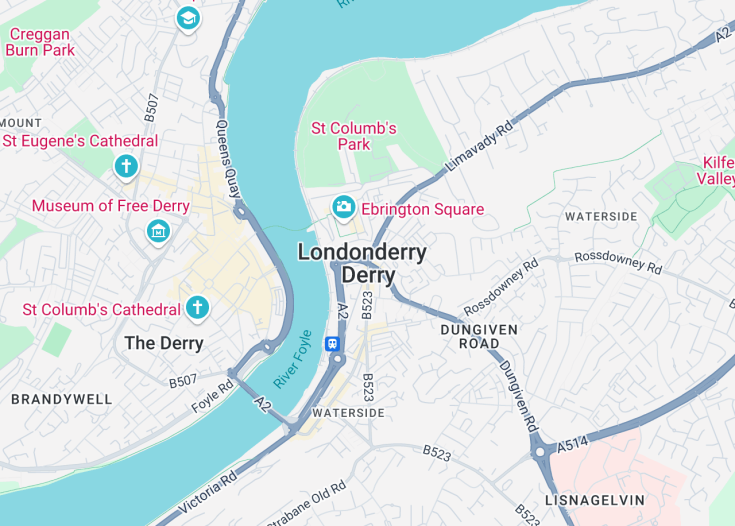Derry, officially known as Londonderry, is a city rich in cultural heritage and history, located in Northern Ireland. Known for its well-preserved 17th-century walls that encircle the vibrant city center, Derry is a symbol of fortitude and resilience.
The city offers a unique blend of historical attractions and contemporary Irish culture, making it a fascinating destination for travelers. From the iconic Peace Bridge to the colorful murals in Bogside, visitors can explore a city that beautifully melds the past with a dynamic present.
Before visiting, check the schedule for the famous Derry Halloween festival, known as one of the best in Europe, to experience the city at its most vibrant.
Consider a guided walking tour of the city walls to fully appreciate the historical significance and panoramic views of Derry.
Top things to do & see in Derry
Select the following sights and activities to discover best tickets and tours available in Derry.
Derry: The Walled City
| Country | Northern Ireland (United Kingdom) |
| Time in Derry | GMT |
| Language spoken | English |
| Population | 85,016 (according to the 2021 Census) |
| Currency | Pound Sterling (£, GBP) |
| Airports |
|
Derry, officially known as Londonderry, is a city rich in history and culture on the banks of the River Foyle. One of the few completely intact walled cities in Europe, Derry’s walls date back to the 17th century.
The city is the second-largest in Northern Ireland and plays a vital role in the cultural landscape of the region. Known for its commitment to the arts, it hosts numerous festivals and events, including the famous Halloween celebration, which is among the largest in Europe.
Derry is not just about historical walls and cultural festivals; it’s also known for its role in the civil rights movement in Northern Ireland. The city was a primary site for the events of the Troubles, including the infamous Bloody Sunday in 1972, making it an important place for historical education.
Today, Derry attracts visitors with its mix of rich history, contemporary culture, and an engaging social scene. It’s also a city of resilience and regeneration, evident in its vibrant music and dining scenes intermixed with historical sites.
The city offers scenic views and pristine natural spaces, close to areas of outstanding beauty such as the Sperrin Mountains and the Donegal Coast. Derry’s unique position makes it a pivotal starting or ending point for exploring the wild Atlantic Way or the Causeway Coast route.
The blend of history, culture, and accessibility to Northern Ireland’s natural splendor makes Derry a compelling visit for anyone traveling through the UK.
Where is Derry?
Derry, often referred to as Londonderry, is situated in the northwest of Northern Ireland, near the border with the Republic of Ireland.
Distances:
| Route | Distance by car | Time by car |
|---|---|---|
| Derry to Belfast | 70 miles | 1 hour 30 mins |
| Derry to Dublin | 150 miles | 2 hours 45 mins |
| Derry to Armagh | 60 miles | 1 hour 15 mins |
What is Derry famous for?
Derry is renowned for its well-preserved 17th-century walls that provide a complete circuit around its inner city. It is also famous for its vibrant cultural scene, especially during the Halloween season when the city comes alive with festivities.
History
Prehistoric and Medieval Origins
The area known as Derry, initially called Doire or Daire, which means “oak grove,” has a history that dates back to the prehistoric era. The strategic hilltop position was later utilised by Saint Columba in the 6th century as a monastic settlement, laying foundational religious and cultural importance in the region.
1600s: Plantation and Walled City
A significant period in the city’s history, the early 17th century saw the implementation of the Plantation of Ulster, which brought numbers of Scottish and English settlers. The construction of the walled city of Londonderry commenced in 1613, symbolizing colonial control but also providing the settlers protection against rebellion. The city walls, completed in 1618, remain a stark representation of this era and are among the best-preserved city fortifications in Europe.
20th Century: The Troubles
Fast forward to the 20th century, Derry became one of the focal points during the Northern Irish conflict known as the Troubles. It witnessed events like the Battle of the Bogside in 1969 and Bloody Sunday in 1972, both pivotal in escalating the conflict. These events have deeply influenced the city’s social, political, and cultural landscape, contributing to its complex identity.
21st Century: Era of Reconciliation and Growth
Moving into the 21st century, Derry has embarked on a path of reconciliation and regeneration. Efforts to acknowledge its contentious history while promoting cultural unity are evident through various initiatives and events such as the UK City of Culture title in 2013, which fostered a renewed sense of community and showcased Derry’s rich arts and cultural scene.
Visit Derry
What to see and do in Derry, Northern Ireland (United Kingdom).
Explore the historic city of Derry and indulge in its unique offerings. Tour the well-preserved Derry City Walls to get a panoramic view of the cityscape. Visit the Peace Bridge, a symbol of unity and reconciliation.
Discover the Museum of Free Derry to get an insightful look at the city’s role during the Troubles. For a touch of natural beauty, stroll along the River Foyle and embrace the tranquil environment. Furthermore, the Guildhall and St. Columb’s Cathedral provide architectural beauty and historical depth, making them must-visit landmarks.
- Derry City Walls
- Peace Bridge
- Museum of Free Derry
- River Foyle
- Guildhall
- St. Columb’s Cathedral
Annual Events in Derry
Derry is host to an array of vibrant events throughout the year. The city’s Halloween festival, regarded as one of the world’s best, transforms Derry into a spectacle of costumes and fireworks every October.
Additionally, the Foyle Maritime Festival welcomes summer with boat parades and nautical festivities. Cultural enthusiasts will appreciate the Derry Jazz Festival each spring, attracting international musicians and fans.
Best time to visit Derry
The most favorable time to visit Derry is during the summer months from June to August when the weather is mild and the city’s green spaces are in full bloom. This period also coincides with several local festivals, making it an excellent time for cultural immersion.
Is Derry worth visiting?
Derry is undeniably worth visiting for its rich historical context, well-preserved architecture, and vibrant cultural scene. The city offers a profound glimpse into Northern Ireland’s complex history while also celebrating its peace and cultural revival.
Whether you’re a history buff, culture seeker, or simply in pursuit of scenic beauty, Derry provides a compelling and enriching experience that resonates with visitors long after they depart.










